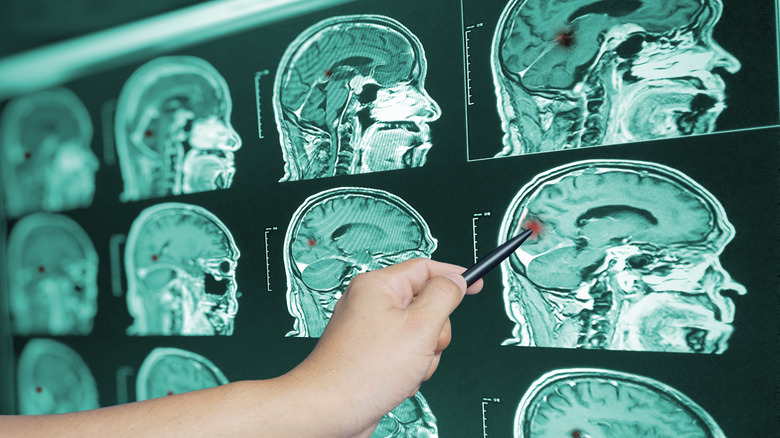Can Mild COVID-19 Affect Brain Health?
Now into the third year of the COVID-19 pandemic, each new day seems to bring forth new scientific findings about the long-term effects of a COVID-19 infection. In the U.S. alone, there have been over 79 million reported cases of COVID-19, with deaths nearing one million (per The Centers for Disease Control and Prevention). The number of actual cases is estimated to be much higher as at-home tests have become more and more readily available to the general population. Since the early days of 2020, medical professionals and scientific researchers determined that SARS-CoV-2, the virus responsible for COVID-19 infection, was able to wreak havoc not only on the lungs, but also on the heart, brain, kidneys, blood vessels, and other organs (via Cureus).
The oddly bizarre symptoms of losing the ability to taste or smell quickly emerged as a hallmark of COVID-19 but had medical experts worried, as it symbolized an attack on the central nervous system, particularly on the brain. While many people recovered their sense of taste and smell after the illness passed, some long-haulers have noted more permanent distortions of their senses, suggesting a potential for permanent damage to the brain.
A new study published in Nature looked at brain scans of individuals who had COVID-19, but weren't hospitalized or needing medical attention, and compared them to people who had not been infected. What they found was startling and confirmed scientific suspicions on the long-term damage done to the brain with SARS-CoV-2 infection.
New study links COVID-19 to abnormal brain changes
A typical healthy brain is composed of both gray and white matter. Gray matter is responsible for processing and interpreting incoming information, while white matter facilitates the transport of information to other parts of the body, according to Johns Hopkins Medicine.
The recent study found that the brain scans of individuals who had COVID-19 four-and-a-half months after infection, compared to those who were never infected, demonstrated more tissue abnormalities and a greater, more rapid loss of gray matter (via CNN).
This is particularly important as it indicates permanent and rapid destruction of the crucial gray matter. While everyone naturally loses some gray matter annually with age, the study found those with prior COVID-19 infection lost an additional 0.2% to 2% compared to uninfected individuals, according to CNN. The findings were more concentrated in the brain area responsible for sensing and interpreting smells.
What made these findings more significant than others in the past is that all participants in the COVID-19 group were deemed to have "mild disease," dispelling the notion that only people who suffered from severe COVID-19 infection could develop long-haul symptoms like brain fog and confusion, or have permanent damage (per CNN). The question still perplexing scientists, however, is "Why?" Why is the virus attacking gray matter and thus linked to more rapid brain and cognitive deterioration? It is clear that additional research is needed to understand the full implications.


